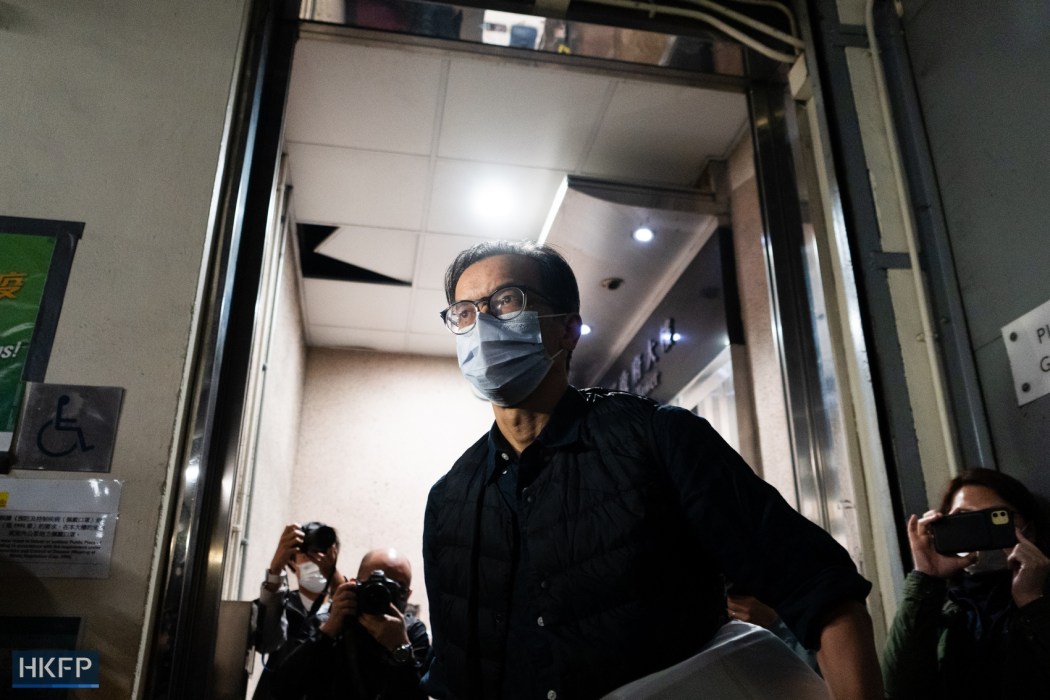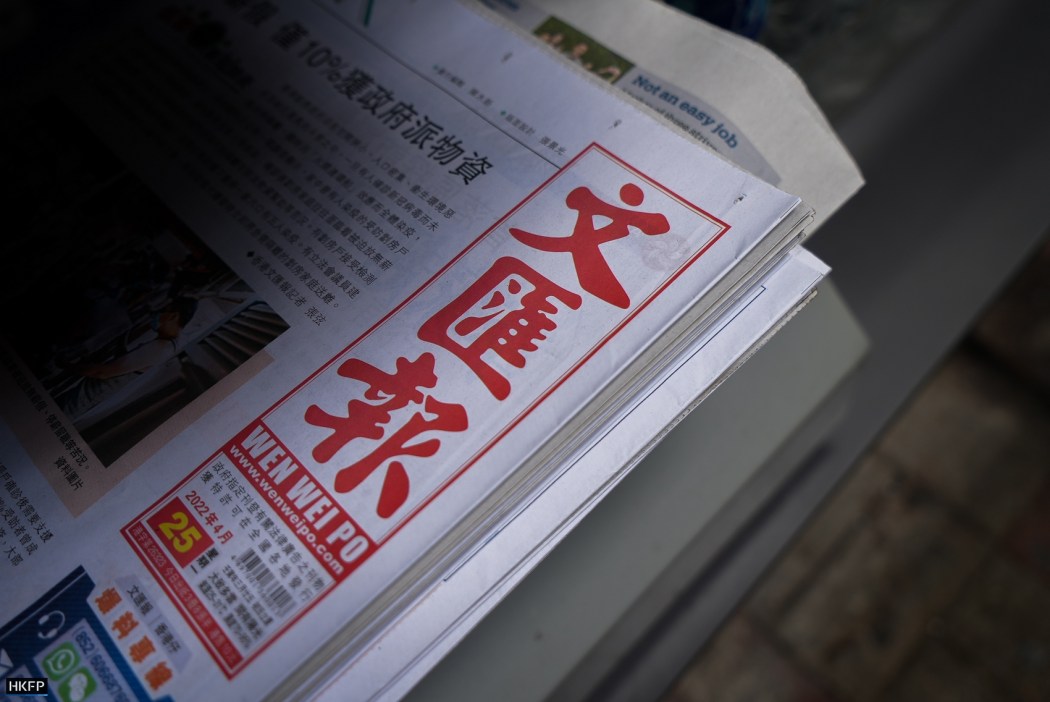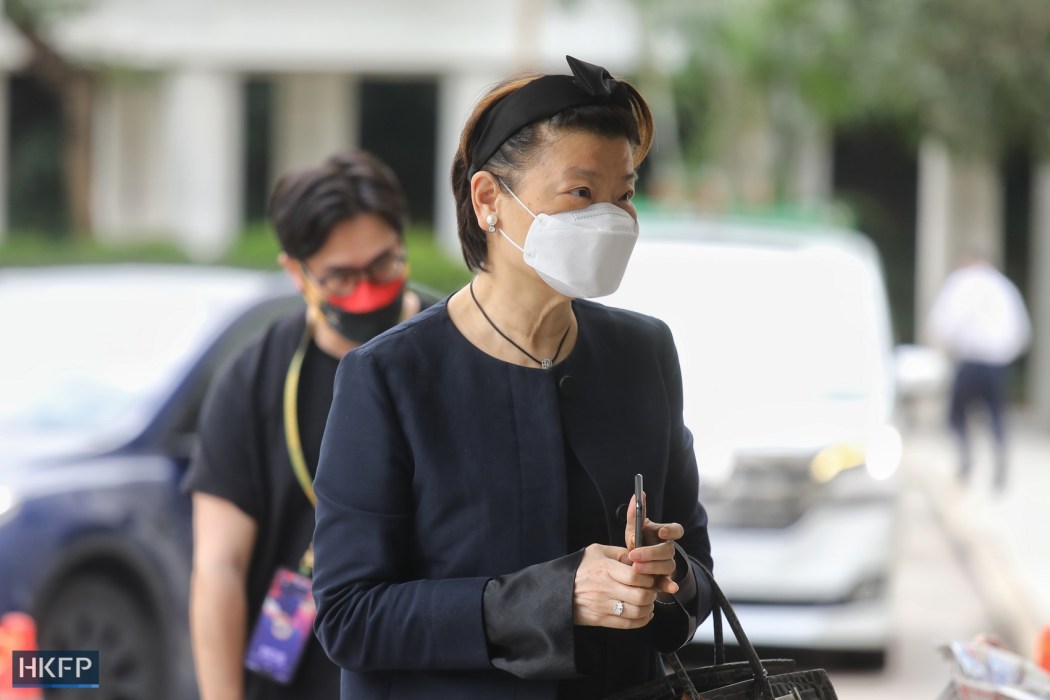During its reexamination of one of Stand News former top editors, the defence has set about trying to counter the prosecution’s case, presenting a “radical” op-ed published by a Beijing-backed newspaper as evidence that commentaries need not contain both sides.
Defence counsel Audrey Eu on Thursday continued her reexamination of Chung Pui-kuen, former editor-in-chief of the shuttered Hong Kong independent media outlet, whose testimony began in January and who has been on the witness stand for more than 30 days.

Chung Pui-kuen, former acting editor-in-chief Patrick Lam, and the outlet’s parent company Best Pencil stand accused of conspiring to publish “seditious” publications. Seventeen articles have been submitted as evidence.
List of the 17 selected articles – Click to see
- Profile of Gwyneth Ho, a candidate in the 2020 legislative primaries held by the pro-democracy camp, published on July 7, 2020.
- Profile of Owen Chow, a candidate in the 2020 legislative primaries held by the pro-democracy camp, published on July 27, 2020.
- Profile of Fergus Leung, a candidate in the 2020 legislative primaries held by the pro-democracy camp, published on August 12, 2020.
- Commentary by Chan Pui-man, Apple Daily’s former associate publisher, criticising speech crimes, published on September 12, 2020.
- Commentary by Nathan Law, a former lawmaker now in self-exile, on “how to resist” under the national security law, published on September 20, 2020.
- Profile of Law on his “battlefront” of calling for sanctions on the Hong Kong government in the UK, published on December 9, 2020.
- Commentary by Law on “resilience in a chaotic world,” published on December 13, 2020.
- Feature interview with Ted Hui, a former lawmaker in self-exile, after he fled Hong Kong with his family, published on December 14, 2020.
- Feature interview with Baggio Leung, a former lawmaker in self-exile, as he called for sanctions on Hong Kong and a “lifeboat scheme for Hongkongers,” published on December 15, 2020.
- Commentary by Sunny Cheung, an activist in self-exile, responding to being wanted by the Hong Kong government, published on December 28, 2020.
- Commentary by Allan Au, a veteran journalist, on “new words in 2020,” which included “national security,” “disqualified” and “in exile,” published on December 29, 2020.
- Commentary by Au calling a national security trial a show, published on February 3, 2021.
- Commentary by Law paralleling the mass arrests of candidates in the democrats’ primaries to mass arrests during Taiwan’s white terror period, published on March 2, 2021.
- Commentary by Au accusing the authorities of “lawfare” in usage of the sedition law, published on June 1, 2021.
- Commentary by Au describing Hong Kong as a disaster scene after the implementation of national security law, published on June 22, 2021.
- Feature about CUHK graduates’ march on campus to mourn the second anniversary of the police-student clash in 2019, published on November 11, 2021.
- Report on Chow Hang-tung’s response to being honoured with the Prominent Chinese Democracy Activist award, published on December 5, 2021.
During the re-examination, Eu summarised the prosecution’s main argument, calling it “three instances of negligence,” namely, suggesting that the outlet had neglected the social circumstances, the emotionally unstable, and the immature, when publishing the 17 allegedly “seditious” articles in question.
Risk of terrorism
In previous hearings, lead prosecutor Laura Ng said Stand News had turned from a news outlet to a political platform with the publication of those 17 articles from July 2020 to December 2021.
“It was a time when the risk of terrorism was still present in the city,” Ng said, adding that the articles may have fuelled radical sentiments.

In response to the claim, the defence counsel cited public speeches by various top officials, including Chief Executive John Lee and the former leader of Beijing’s liaison office in city, which suggested that Hong Kong had returned to prosperity after the implementation of the national security law.
“The prosecutor told us that terrorism was blossoming when you were publishing articles… but I’d think we better listen to what the officials said,” Eu said. She added that the terrorism threat level of Hong Kong remained “appropriate,” according to a statement released by security chief Chris Tang.
Chung agreed with Eu, saying that the number of social movements had declined drastically in that period. “I didn’t see any sign that terrorism was ‘blossoming’,” he said.
Balanced op-eds
Eu then moved on to another argument by the prosecution, which suggested all commentaries should include complete context, in order to prevent potentially vulnerable individuals, such as those who are immature or emotionally unstable, from being misled.
The prosecutor also said commentaries should provide balance or counter suggestions after criticising the authorities.
Eu cited the sedition law – under which Chung has been charged – arguing that it did not specify offering “counter suggestions” in the face of criticism. She then submitted several op-eds published by other news platforms to the court, including those from state-backed newspapers Ta Kung Pao and Wen Wei Po.

One editorial published by Ta Kung Pao criticised judges for “abetting rioters” and politicising the Judiciary, saying it had “given up on professionalism.”
Eu asked Chung, “[D]o you think this is still a commentary?”
“Yes, it is, this type of commentary that denounces others has always existed in Hong Kong. Some people like it, some don’t, but it is a product of the freedom of speech in the city,” Chung said.
The veteran journalist added that since state media was an extension of public power, the freedom of speech enjoyed by the powerless should not be less than that enjoyed by such publications. However, the reality was that independent media was often restricted by red lines, he said.
“Do you think this op-ed is more ‘radical’ than any article ever published by Stand News?” Eu asked.
“I think so,” the former chief editor said.
Eu then concluded that simply writing about “anti-communism” should not be equivalent to “endangering national security,” adding that the prosecution should evaluate whether the articles constituted “real risk.”
The senior counsel then cited the former secretary for justice, saying “one needs to look at the whole context when interpreting the ordinance.”

“That being said, [the prosecutor] cannot say that we ‘hate’ the Communist Party just because we mentioned ‘anti-communism’ … [She] needs to look at whether the article has violated the sedition law as a whole while considering the ordinance, which secures freedom of speech too” Eu said.
The trial will continue on Friday.
Sedition law
The anti-sedition legislation, which was last amended in the 1970s when Hong Kong was still under British colonial rule, falls under the city’s Crimes Ordinance. It is separate from the Beijing-imposed national security law, and outlaws incitement to violence, disaffection and other offences against the authorities.
Non-profit digital news outlet Stand News ceased operations and deleted its website in December 2021 after its newsroom was raided by over 200 national security police officers. Seven people connected to the independent outlet were arrested on suspicion of conspiring to “publish seditious publications.” However, only ex-chief editor Chung Pui-kuen, acting chief editor Patrick Lam and parent company Best Pencil (Hong Kong) Limited were charged under the colonial-era law.
Advocacy groups, the UN, and Western countries criticised the arrests as a sign of declining media freedoms, while now-Chief Executive John Lee condemned “bad apples” who “polluted” press freedom following the raids.
The trial began in October 2022 with the court considering 17 allegedly seditious articles, including interviews, profiles, hard news reporting and opinion pieces. Sedition carries a maximum penalty of two years behind bars.
Support HKFP | Policies & Ethics | Error/typo? | Contact Us | Newsletter | Transparency & Annual Report | Apps
Help safeguard press freedom & keep HKFP free for all readers by supporting our team
























